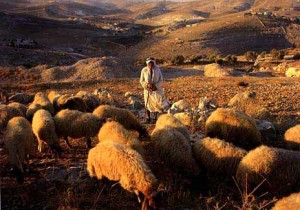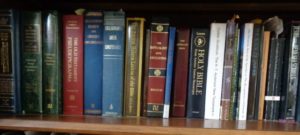 Have you ever noticed all the references in the Bible to shepherds and sheep?
Have you ever noticed all the references in the Bible to shepherds and sheep?
The Hebrew word most often translated as “shepherd(s)” in the KJV is “ra’ah” (H7462) and means “to pasture, tend, graze, feed” according to Brown Driver Briggs. While it is only translated as “shepherd” or “shepherds” a total of 61 times, the word “ra-ah” appears almost 3 times as often (172).
The first mention appears in Genesis 4, addressing the occupation of Abel, the younger brother of Cain, who was a “ra’ah” of sheep:
Now Adam knew Eve his wife, and she conceived and bore Cain, saying, “I have gotten a man with the help of the LORD.” And again, she bore his brother Abel. Now Abel was a keeper (H7462 “ra’ah”) of sheep, and Cain a worker of the ground. (Genesis 4:1-2 ESV)
The next mention addresses the occupation of Abram’s household and his nephew Lot’s household…
(Genesis 13:7-8 ESV) and there was strife between the herdsmen (H7462 “ra’ah”) of Abram’s livestock and the herdsmen (H7462 “ra’ah”) of Lot’s livestock. At that time the Canaanites and the Perizzites were dwelling in the land. Then Abram said to Lot, “Let there be no strife between you and me, and between your herdsmen (H7462 “ra’ah”) and my herdsmen (H7462 “ra’ah”), for we are kinsmen.
But in this case these are not necessarily sheep that they are pasturing, tending, grazing and feeding, but more specifically cattle or other form of livestock.
So Abram went up from Egypt, he and his wife and all that he had, and Lot with him, into the Negeb. Now Abram was very rich in livestock, in silver, and in gold…And Lot, who went with Abram, also had flocks and herds and tents, so that the land could not support both of them dwelling together; for their possessions were so great that they could not dwell together, and there was strife between the herdsmen of Abram’s livestock and the herdsmen of Lot’s livestock. At that time the Canaanites and the Perizzites were dwelling in the land. (Genesis 13:1-2, 5-7 ESV)
The next mention addresses the livestock of Isaac’s household…
…and the man [Isaac] became rich, and gained more and more until he became very wealthy. He had possessions of flocks and herds and many servants, so that the Philistines envied him. (Now the Philistines had stopped and filled with earth all the wells that his father’s servants had dug in the days of Abraham his father.) And Abimelech said to Isaac, “Go away from us, for you are much mightier than we.” So Isaac departed from there and encamped in the Valley of Gerar and settled there. And Isaac dug again the wells of water that had been dug in the days of Abraham his father, which the Philistines had stopped after the death of Abraham. And he gave them the names that his father had given them. But when Isaac’s servants dug in the valley and found there a well of spring water, the herdsmen (H7462 “ra’ah”) of Gerar quarreled with Isaac’s herdsmen (H7462 “ra’ah”), saying, “The water is ours.” So he called the name of the well Esek, because they contended with him. Then they dug another well, and they quarreled over that also, so he called its name Sitnah. And he moved from there and dug another well, and they did not quarrel over it. So he called its name Rehoboth, saying, “For now the LORD has made room for us, and we shall be fruitful in the land.” (Genesis 26:13-22 ESV)
The next mention addresses the livestock of Laban’s household…
He said, “Behold, it is still high day; it is not time for the livestock to be gathered together. Water the sheep and go, pasture (H7462 “ra’ah”) them.” But they said, “We cannot until all the flocks are gathered together and the stone is rolled from the mouth of the well; then we water the sheep.” While he was still speaking with them, Rachel came with her father’s sheep, for she was a shepherdess (H7462 “ra’ah”). (Genesis 29:7-9 ESV)
We learn later that Jacob became a shepherd of Laban’s flocks and eventually earned his own flocks while maintaining the care of Laban’s.
These twenty years I have been with you. Your ewes and your female goats have not miscarried, and I have not eaten the rams of your flocks. What was torn by wild beasts I did not bring to you. I bore the loss of it myself. From my hand you required it, whether stolen by day or stolen by night. There I was: by day the heat consumed me, and the cold by night, and my sleep fled from my eyes. These twenty years I have been in your house. I served you fourteen years for your two daughters, and six years for your flock, and you have changed my wages ten times. (Genesis 31:38-41 ESV)
Interestingly we learn later that Jacob’s sons were all engaged in the occupation of pasturing, tending, grazing, feeding his flocks as well.
(Genesis 37:2 ESV) These are the generations of Jacob. Joseph, being seventeen years old, was pasturing (H7462 “ra’ah”) the flock with his brothers. He was a boy with the sons of Bilhah and Zilpah, his father’s wives. And Joseph brought a bad report of them to their father.
(Genesis 37:12-13 ESV) Now his brothers went to pasture (H7462 “ra’ah”) their father’s flock near Shechem. And Israel said to Joseph, “Are not your brothers pasturing (H7462 “ra’ah”) the flock at Shechem? Come, I will send you to them.” And he said to him, “Here I am.”
(Genesis 37:16 ESV) “I am seeking my brothers,” he said. “Tell me, please, where they are pasturing (H7462 “ra’ah”) the flock.”
Shortly thereafter Joseph was sold into slavery and was reported as being dead to his father Jacob. While he was away however, he managed another’s household affairs, ended up in jail and over time was released and given rule over the land of Egypt under Pharaoh.
There came to be a great famine in the land which brought Joseph’s brothers to Egypt for food, and eventually they discover Joseph is alive and well, the one to whom they sought for their sustenance.
When Joseph and his father, Jacob/Israel, were reunited, he told his brothers they and their flocks and herds would be provided a place to live if they did as he instructed.
Joseph said to his brothers and to his father’s household, “I will go up and tell Pharaoh and will say to him, ‘My brothers and my father’s household, who were in the land of Canaan, have come to me. And the men are shepherds (H7462 “ra’ah”), for they have been keepers of livestock, and they have brought their flocks and their herds and all that they have.’ When Pharaoh calls you and says, ‘What is your occupation?’ you shall say, ‘Your servants have been keepers (H7462 “ra’ah”) of livestock from our youth even until now, both we and our fathers,’ in order that you may dwell in the land of Goshen, for every shepherd (H7462 “ra’ah”) is an abomination to the Egyptians.” (Genesis 46:31-34 ESV)
Joseph’s brothers did as they were instructed and were given the land of Goshen to dwell.
And here is the first mention of God being identified as a Shepherd over Israel/Jacob…
And Israel stretched out his right hand and laid it on the head of Ephraim, who was the younger, and his left hand on the head of Manasseh, crossing his hands (for Manasseh was the firstborn). And he blessed Joseph and said, “The God before whom my fathers Abraham and Isaac walked, the God who has been my shepherd (H7462 “ra’ah”) all my life long to this day, the angel who has redeemed me from all evil, bless the boys; and in them let my name be carried on, and the name of my fathers Abraham and Isaac; and let them grow into a multitude in the midst of the earth.” (Genesis 48:14-16 ESV)
I find it very interesting that Genesis clearly identifies the occupation of our fathers, particularly Abraham, Isaac and Jacob to be that of one who pastures, tends, grazes and feeds the flocks and herds. It seems to me that this was the original intent of the Creator for all of mankind.
Then God said, “Let us make man in our image, after our likeness. And let them have dominion over the fish of the sea and over the birds of the heavens and over the livestock and over all the earth and over every creeping thing that creeps on the earth.” So God created man in his own image, in the image of God he created him; male and female he created them. And God blessed them.
And God said to them, “Be fruitful and multiply and fill the earth and subdue it, and have dominion over the fish of the sea and over the birds of the heavens and over every living thing that moves on the earth.”
And God said, “Behold, I have given you every plant yielding seed that is on the face of all the earth, and every tree with seed in its fruit. You shall have them for food. And to every beast of the earth and to every bird of the heavens and to everything that creeps on the earth, everything that has the breath of life, I have given every green plant for food.” And it was so. (Genesis 1:26-30 ESV)
Genesis lays the foundation for the rest of Scripture. Personally, I don’t believe we can fully appreciate all the references such as “sheep without a shepherd“, “The LORD is my Shepherd” and “If you love me, feed my sheep“, without experiencing first hand on some level what it means to pasture, tend, graze and feed livestock of some kind. (And I’m not talking about feeding a pet cat or dog food from a can or a bag purchased at a store. 😛 )
Egypt despised the occupation of shepherds. I don’t know exactly why, though I’ve read some theories.
Since my husband made the decision several years ago to pasture, tend, graze and feed livestock of our own (cows, goats, ducks and chickens), I’ve begun to appreciate more of what’s involved in the care of these animals. I’m grateful for the opportunity.
If you’ve never experienced this for yourself, consider exposing yourself to this process in a tangible way. Take a field trip…you might be surprised at what you discover. 😉

